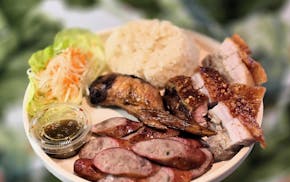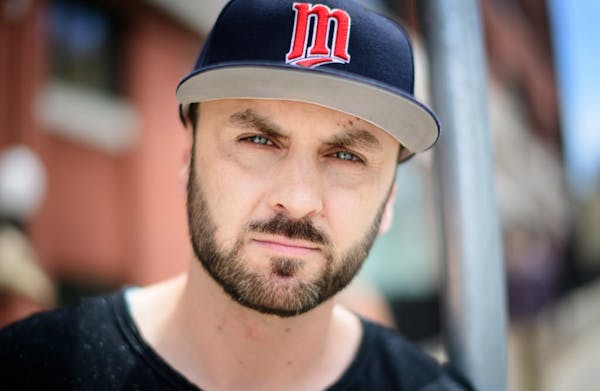John Taylor thinks he has figured out "this whole legacy band thing," which was his gentlemanly British way of referencing the fact that Duran Duran is essentially a dinosaur act now 35 years into its recording career.
"All these people coming out to see us want to hear the old hits, but they don't want to feel old themselves," said the bassist and co-founder of the 1980s London band. "So you have to mix things up, try to stay contemporary to a certain point and try to maintain an element of surprise."
Taylor and his three mostly original bandmates — singer Simon Le Bon, keyboardist Nick Rhodes and drummer Roger Taylor (no relation) — tastefully mix old and new sounds and offer a few surprises on their latest album, "Paper Gods," which they're promoting with an Xcel Energy Center concert Saturday in St. Paul. (Rhodes has temporarily dropped off the tour for a family matter.)
The record includes guest contributions by innovative R&B star Janelle Monáe and "Uptown Funk" hitmaker Mark Ronson and was co-produced with Nile Rodgers, whose '70s group Chic (of "Le Freak" and "Good Times" fame) is the opener on Duran Duran's tour.
Talking by phone from his house in Los Angeles two weeks ago after finishing their European trek, Taylor mentioned being back in England during the Brexit vote: "It's a catastrophe there right now," he said. "But maybe that's what's required. Maybe it needs a good shake-up."
Here, Taylor answers five questions about Duran Duran's pending American venture.
Q: Last time the band was in town you played a club [Epic in 2011], and you've gone back and forth a lot like that. What sort of circumstances keep bringing you back to the arena level?
A: It's a fantastic bill this time, having Chic on the road with us. That's not to be underplayed. They're fantastic. It feels like an event, not just a regular show, which is something we've always strived for. It feels like this is the most perfect Duran Duran bill ever. We played some shows when the album first came out last September in California, and it felt like the excitement around the band had really been rejuvenated. I don't really know why. It's like sometimes there's just a lot of love for the band floating around.
Q: Chic's leader Nile Rodgers helped produce "Paper Gods" and seems to be both a hero and friend of the band. What's it like having him open for you every night?
A: It's fantastic, and it's intimidating. To have that show he delivers before us is such a treat for the audience. There really aren't that many artists you can go see nowadays that deliver the kind of show that Nile and his crew offer. It's so [bleeping] funky and tight. We're standing to the side every night thinking, "Holy [expletive], we really gotta step up our game." But that's good. It helps us in that fight against things getting a little blasé. It's good to have that inspiration every night, especially as you get older [laughs].
Q: Reading reviews, it sounds like you guys really strive to make songs off the new album centerpieces of the shows. How big of a challenge is that to pull off?
A: You're constantly trying to create this trompe l'oeil, this illusion that what you're doing is contemporary. We have all these songs from the last 30 years, but we're trying to create a contemporary show. So these songs help us reframe the old songs.
We are very happy with this album. We worked very hard on it, and we got some very special guests on it. The album goes a long way to fulfill the promise of the band of the '80s, I think. It's like we were a progressive band with hit singles, and at some point we became consumed by being a pop band. By the mid-'80s, we were pinups and we were on the cover of 16 Magazine, and that just dominated who we were. I think we've taken back more of the progressive element that we had before all that with this album.
Q: Duran Duran is so closely tied to the early-'80s heyday of music videos and MTV, and in some ways you're really the quintessential MTV band. Is that a blessing or curse in retrospect?
A: At the time, it felt like a curse. I used to get so frustrated by the degree to which people paid attention to our videos. It felt like the conversations about our videos would take up half of the interviews we did. With our recording and songwriting, we always took great care and were very particular about what we wanted. With videos, we just sort of fell into them.
We were fortunate, though, that the medium was just getting popular at the time. It really gave us our identity. Looking back now, I'm so happy that it did happen for us the way that it did. I don't think the band would've had the success it had without videos.
Q: How much have things changed backstage for you guys since the wild and sordid days of the Rio Tour, when you played our famous local club First Avenue in 1982?
A: I don't think of us as being particularly sordid. We liked to party, yeah. You could not not party. Here we were in this strange land, and there'd be all these pretty girls around. It was hard not to get carried away. We liked it for a while.
For me, I wrote about what happened to me and my struggles with the partying in my autobiography [2012's "In the Pleasure Groove: Love, Death & Duran Duran"]. But back then, it was all working. Those first couple of trips to America were unbelievably fun.
These days, we don't have quite as much energy [laughs]. Most of the energy we have goes into the show, and we try to conserve it for that when we're on the road. We might go check out a museum or find somewhere special to eat, but that's about it.
In 1982, when we got offstage, we were just getting started. The show was just the appetizer. Now, the show is the whole meal. And that's how it should be, really.
Chris Riemenschneider • 612-673-4658
@ChrisRstrib

The 5 best things our food writers ate this week

The 5 best things our food writers ate this week

Critics' picks: The 14 best things to do and see in the Twin Cities this week

The 5 best things our food writers ate in the Twin Cities this week

